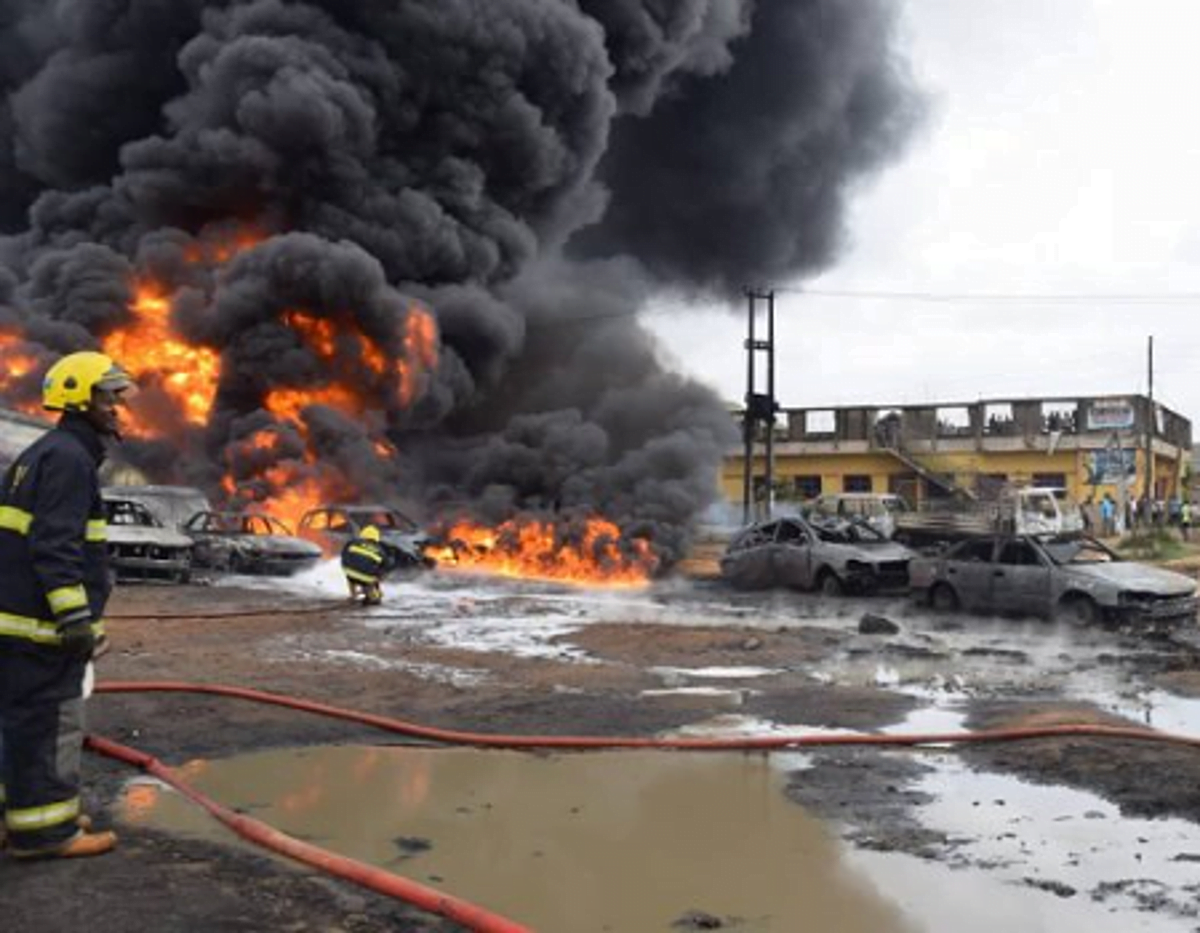Editorial
Fuel subsidy removal: A reoccurring debacle
The back and front surrounding fuel subsidies removal or continuity had been a reoccurring debacle within Nigeria’s public space. Despite the country being a leading crude oil producing Nation, dependence on fuel importation continued to gulp almost half its annual budget.
Economic Experts have not hidden their disdain for the wastage dubbed fuel subsidies payment, however, organised labour, led by the Nigeria Labour Congress, Trade Union of Nigeria are ready to battle the government on the mention of subsidy removal. From time to time, since the return of Democracy in 1999, the issue of fuel subsidy removal has been an intense subject of debate.
President Muhammadu Buhari’s administration had hinted on subsidy removal in June. However, on Thursday there was a new twist, the National Economic Council, headed by the Vice President, Prof Yemi Osinbajo suspended the idea of fuel subsidies removal by the Buhari’s administration.
Nigeria’s Minister of Budget and National Planning, Zainab Ahmed, who had been pushing for the fuel subsidies removal with the insights that the Country would save close to N7 trillion, surprisingly threw in the towel, suspended the plan.
The council however agreed on the need to continue the discussion on the matter and the necessary preparatory work in conjunction with states and representatives of the incoming administration.
“Council agreed that the timing of the removal of fuel subsidy should not be now. But that we should continue with all of the preparatory works that need to be done and that this preparatory has to be done in consultation with the states and other key stakeholders including representatives of the incoming administration,” she said.
“Council agreed that the fuel subsidy must be removed earlier rather than later because it is not sustainable. We cannot afford it anymore. But we have to do it in such a way that the impact of the subsidy is as much as possible, mitigated on the lives of ordinary Nigerians.
“So, this will require looking at alternatives to the fuel subsidy that needs to be planned for and subsequently put in place. But also what needs to be done to support the people that will be most affected as a result of the removal.”
In line with Minister’s position, Nigerian NewsDirect in this editorial writes that the whole issue concerning fuel subsidy removal should be left to Bola Ahmed Tinubu’s administration.
The outgoing government need not initiate what it would be available to see through.
In this view, this paper believes that the fuel subsidies removal or continuity should be a cross for Tinubu and his government to carry.
According to an Expert, allowing the incoming administration to take responsibility for fuel subsidy should be the default position since the current government has announced a budgetary provision for fuel subsidy up till June 2023 which also aligns with the position of the Petroleum industry Act as amended.
Nigerin NewsDirect notes that rather than stir another round of controversy and confusion concerning fuel subsidy the entire gamut of the matter ought to be left for the new administration.
To this end, our stand is that NEC’s announcement on the suspension of fuel subsidy was really unnecessary owing to the fact that the Buhari government has roughly one month left to exit.
The National Economic Council should avoid making policy pronouncements that may make or mar the new administration.
This being said, the incoming government must consult widely before it would take a stand on whether to remove fuel subsidies or not.
Editorial
Gas explosions: Nigeria and its avoidable tragedies


Nigerians die daily for reasons so avoidable it would make a 19th century peasant weep. The deaths are often a product of systemic wickedness, nonchalance, and greed. Too often have gas explosions claimed the lives of Nigerians untimely. Whether it is the leaders refusing to enforce the checks and balances for personal gain, or citizens selling defective gas cylinders, it all balls down to a collective aversion for kindness.
The internet is rife with news of this tragedy occurring in a Sisyphean cycle. Jolted by the cries of the populace, the leaders promise reprieve, release press statements and in the weeks that follow, little to nothing happens. “One must imagine Sisyphus happy,” Camus wrote. Unfortunately, our Nigerian dead imagine nothing.
While people relaxed from their labour, were preparing for the Workers Day celebrations, nine people including a pregnant woman were injured in Tuesday’s gas cylinder explosion at Alaba Lane, Alayabiagba Community of Ajegunle-Apapa, Lagos.
“The fire explosion started around 1:30 pm and immediately, two tricycles were burnt, school children coming back from school were affected. A particular young man was seriously affected as his body was peeling off, but rushed to the Gbagada General Hospital,” according to reports.
The usual suspect is, of course, negligence, as the Director of Lagos State Fire and Rescue Service, Margaret Adeseye, puts it: “preliminary investigation revealed that several various gas cylinders traded within the neighbourhood have one triggered from a susceptible leakage leading to the snapping of a high tension cable and resultant Fire.”
The explosion razed down “four commercial tricycles, six lock-up shops, a bungalow part of properties, while salvaging adjoining structures including a major fuel service station.” Children were hurt, the future of the nation plunged, as usual into avoidable misfortune.
The way out is through. The press releases are wonderful PR statements but they do not bring back the dead, as was the case in Ogun State recently where a truck explosion cost the nation another life. The leaders must enforce the checks and balances put in place. The law is no decoration.
We mustn’t wait until a politician’s family member is involved in a tragic gas accident before “banning” (as is the default response of the Nigerian leadership). The leaders must realise that such misfortunes are contagious, and money is hardly a bulwark against 3rd degree burns in a nation where all its doctors are fleeing.
Renewed Hope requires renewed action. This is all that Nigerians ask of its leaders. All agencies responsible for monitoring trucks, cylinders need to work together to defeat this peculiar evil. Like COVID-19, gas explosions are no respecter of persons.
Of course, citizens too must do their part and resist the allure of profit over the death of others. A society without empathy is headed for a dystopia. It will not matter the price of petrol or electricity tariff, if all that matters is the pursuit of super profit at the expense of one’s neighbour. We owe it to the dead to live fully and graciously. To escape, as we should, avoidable tragedies.
Editorial
Nigeria must act now to mitigate flood disasters


As the rainy season looms ahead, a palpable sense of concern grips the nation.The recent cautionary message from the Federal Government to 31 state governors regarding the looming threat of floods from April to November serves as a wake-up call, demanding swift and concerted action from both state and federal authorities.
Presented by Minister of Water Resources and Sanitation Joseph Utsev, the 2024 Annual Flood Outlook paints a bleak picture, underscoring the urgent need for preemptive measures. It is not merely an emphasising advisory; it is a resounding call to arms.
The spectre of past flood calamities in Kano, Taraba, Lagos, and other states still haunts our collective memory.
The haunting images of devastated homes, displaced families, and shattered livelihoods serve as poignant reminders of the human toll exacted by our complacency.
It is imperative that we glean lessons from these tragedies and take proactive steps to forestall the impending catastrophe.
The warning issued by the Federal Government is crystal clear: floods are imminent, and the time to act is now.
The Nigeria Hydrological Services Agency’s classification of 148 local government areas across 29 states, including Lagos, Kano, and Delta, as high flood-risk zones emphasising the gravity of the situation.
Every moment of inaction heightens the risk to countless lives and properties. State governors, local authorities, and relevant agencies must set aside differences and collaborate effectively to implement robust flood preparedness and mitigation measures.
From infrastructure reinforcement to early warning systems and community awareness campaigns, a comprehensive approach is imperative to safeguard vulnerable communities.
As responsible stewards of our nation’s welfare, we cannot afford to be caught off guard. Let us heed the warning, unite in purpose, and proactively address this looming threat.
The cost of inaction is too grave to contemplate, and the time to act decisively is now. This is not a drill.
The minister’s revelation that 31 states face high flood risks, while all 36 states and the Federal Capital Territory will experience moderate flooding, demands immediate attention and collective action.
“The high flood-risk states are Adamawa, Akwa Ibom, Anambra, Bauchi, Bayelsa, Benue, Borno, Cross River, Delta, Ebonyi, Edo, Imo, Jigawa, Kaduna, Kano, Katsina, Kebbi, Kogi, Kwara, Lagos, Nasarawa, Niger, Ogun, Ondo, Osun, Oyo, Plateau, Rivers, Sokoto, Taraba, Yobe,” the Minister said.
We cannot afford to wait until the waters rise and lives are lost. The time to act is now. It’s imperative that federal and state governments, agencies, and local communities join forces to mitigate the impact of floods.
This requires a coordinated response, including public awareness campaigns, infrastructure upgrades, emergency preparedness plans, and investment in flood mitigation projects.
The future of our nation depends on it. Let us heed the warning and take proactive steps to build a more resilient Nigeria, where lives and properties are protected from the ravages of flooding. The clock is ticking; let us act now to avoid a catastrophe.
While 31 states face high flood risks, the remaining five states must also be proactive in their preparations. It’s not enough to simply warn residents to relocate from flood-prone areas; state governments must provide safe and conducive spaces for relocation, complete with essential services like relief materials, healthcare, and security.
This will help mitigate the trauma faced by displaced families. Citizens, too, have a critical role to play. They must be willing to relocate from their homes and comfort zones to prevent avoidable deaths and losses. The stark reality is that flood disasters are devastating, as seen in 2023 when 45 lives were lost, 171,545 persons displaced, and 22,666 homes partially damaged, with 5,358 others completely destroyed.
The economic toll was equally staggering, with a $4.6 billion bill that significantly dented Nigeria’s GDP. Let us learn from the past and take collective responsibility for flood preparedness. State and federal governments, agencies, and citizens must work together to build a more resilient nation, where lives and properties are protected from the ravages of flooding. The time to act is now.
In 2022, flooding claimed 662 citizens; 2.43 million others were displaced and 3,174 were injured nationwide, per NEMA.
The financial losses were estimated at $9.12 billion by the Federal Government, and by a United Nations agency at $7 billion. A UN report stated that food insecurity was aggravated in the country as 569,000 hectares of farmland were destroyed by the flood.
According to the then Minister of Water Resources, Suleiman Adamu, 178 LGAs in 32 states were declared “highly probable flood risk states.”
Although climate change remains a global concern, leading to flash floods, droughts, forest fires, and cyclones, the government must not make excuses.
They need to take lessons from previous floodings and replace their nonchalance with strategic actions and campaigns. They must do all they can to avoid the repetition of losses of lives and properties.
The citizens must play their part by clearing drainage in their vicinity, cultivating good waste disposal and environmentally friendly culture. To entrench this, the government must place strict surveillance and enforce stiff penalties against erring residents.
State governments should demolish structures erected on flood paths to enable rainwater to drain appropriately.
NGOs in the environmental niche should activate campaigns distilled in local languages through the media to prepare citizens for the flood.
The federal and state governments should be proactive in the deployment of ecological funds to provide guardrails against natural disasters. This must be used for pre-emptive measures like building bridges, desilting rivers, evacuating canals and drainage, and building dams and levees. The dams would help preserve excess rainfall to irrigate farmland during the dry season.
The government must fully embrace its onerous duty to safeguard lives and properties.
Editorial
Preparing for a challenging farming season: NiMet’s forecast and the need for proactive action


As the farming season beckons, Nigerian farmers are bracing themselves for a turbulent ride. The Nigerian Meteorological Agency’s (NiMet) forecast of a delayed and shorter rainy season has sent shockwaves across the agricultural community, threatening to upend the delicate balance of our food security.
With millions of farmers poised to plant their crops, the clock is ticking. Will our policymakers and stakeholders rise to the challenge, or will we reap a harvest of regret? According to NiMet, this year’s rainy season will commence later than usual, with the central states expecting the onset of rains around May 29 and the northern states around June 13.
Moreover, the season is predicted to end earlier than usual, between October 6 and November, in many states. This forecast raises concerns for farmers, as a shorter rainy season can lead to reduced crop yields and increased risk of drought.
To mitigate these challenges, NiMet advises planting early-maturing crop varieties at the beginning of the season. This is a wise recommendation, as it allows farmers to adapt to the predicted weather patterns and minimize potential losses.
With predictions ranging from October 6 to November, regions including Yobe, Jigawa, Sokoto, and Lagos are bracing for a shorter agricultural window. This forecast emphasised the critical importance of proactive planning and early adoption of fast-maturing crop varieties.
The essence of NiMet’s warning is clear: farmers must act swiftly to secure the necessary resources for a successful harvest. From fertilizers to seeds, the time to procure vital inputs is now, to mitigate potential setbacks and ensure a fruitful season. Traditionally, this period marks the commencement of government initiatives to facilitate the purchase and distribution of agricultural inputs. However, the silence on this front is deafening.
Instead of prioritising the long-term sustainability of agriculture, many officials seem fixated on short-term palliative measures, neglecting the imperative of future agricultural prosperity. As the countdown to the abbreviated season begins, the call to action grows louder. Farmers must seize the moment, equipping themselves for the challenges ahead, while policymakers must refocus their attention on fostering a resilient agricultural sector for generations to come.
Only through collective effort and foresight can we navigate the uncertain terrain ahead and ensure a bountiful harvest for all. As the federal government pledges to revamp the textile industry, Nigerian farmers are grappling with a more pressing concern – the exorbitant cost of fertilizers and other essential inputs. A bag of fertilizer now costs a staggering N48,000, forcing farmers to either purchase substandard products or resort to traditional alternatives, resulting in poor yields and revenue losses. The high costs of seeds, herbicides, pesticides, labour, and fuel have pushed small-holder farmers to the brink.
Despite President Bola Ahmed Tinubu’s assurances of support, including a promise to release 225,000 metric tons of fertilizers, seedlings, and other inputs in August 2023, concrete actions are yet to be seen. With food prices soaring nationwide, it is imperative that the government takes immediate steps to address the plight of farmers, who are crucial to the nation’s food security.
We urge the government to translate its promises into tangible support for farmers, including affordable access to quality inputs, to ensure a bountiful harvest and a food-secure future for Nigeria. We commend the Central Bank of Nigeria’s release of 2.15 million bags of fertilizer to the Federal Ministry of Agriculture and Food Security. However, it is alarming that there has been no update on the distribution of this vital commodity since the handover over a month ago.
Furthermore, we urge state governments to take their responsibilities in ensuring adequate input supply to farmers more seriously. We also call on the federal government to implement policies that facilitate the supply of fertilizers, seeds, and other inputs to the markets, thereby controlling rising prices.
The Presidential Fertilizer Initiative needs to be reviewed to ensure fertilizer blending plants resume production. Our farmers urgently need government support to access necessary inputs for successful cultivation. As the rains continue to falter, Nigerian farmers face an uphill battle. We urge the government to seed hope by providing essential resources – quality seeds, fertilizers, and equipment – to help them weather the storm.
Climate-resilient agriculture initiatives and weather insurance schemes will also help farmers adapt and thrive. But, there’s a greater challenge to tackle – the menace of bandits and militias terrorizing farmers, forcing them off their lands, and threatening our food security.
It’s time for decisive action! The government must act swiftly to protect our farmers, their farms, and our collective future. Let’s join forces to cultivate a brighter tomorrow, where our farmers can plant, grow, and harvest without fear. The time to act is now, for the sake of our nation’s food security and stability. Let’s sow the seeds of resilience and reap a bountiful harvest for generations to come!
-
capital market2 years ago
Rt.briscoe, FBNH, Others halts negative performance of stock market
-
Finance3 months ago
Court orders Sen. Victor Umeh to repay N136m bank debt to AMCON
-



 Abuja Update2 months ago
Abuja Update2 months agoUNDP, FG partnership needed to achieve inclusion, equity- Minister
-
Abuja Update1 month ago
Banks drive stock market performance with N147bn gain
-



 Business1 week ago
Business1 week agoTingo Group unveils Tingo Electric, Tingo Cola drink at Lagos launch
-



 Health2 weeks ago
Health2 weeks agoCapacity training will reduce migration of health workers- NPHCDA
-
News4 months ago
Oil thieves sponsoring malicious media campaign against Navy – Spokesman
-



 Infotech1 month ago
Infotech1 month agoWorld Backup Day: NITDA urges Nigerians to ensure backup of data






